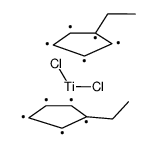35625-75-3
| 中文名 | 二(乙基环戊二烯)二氯化钛(IV) |
|---|---|
| 英文名 | 2-ethylcyclopenta-1,3-diene,titanium(4+),dichloride |
| 中文别名 | 二(乙基环戊二烯基)二氯化钛(IV) |
| 英文别名 | MFCD01862447 |
| 熔点 | 137-140ºC |
|---|---|
| 分子式 | C14H18Cl2Ti |
| 分子量 | 305.06600 |
| 精确质量 | 304.02700 |
| LogP | 4.98240 |
| 储存条件 | 密封、阴凉干燥保存 |
| 稳定性 | 常规情况下不会分解,没有危险反映 |
| 计算化学 | 1.疏水参数计算参考值(XlogP):无 2.氢键供体数量:0 3.氢键受体数量:4 4.可旋转化学键数量:2 5.互变异构体数量:无 6.拓扑分子极性表面积0 7.重原子数量:17 8.表面电荷:0 9.复杂度:250 10.同位素原子数量:0 11.确定原子立构中心数量:0 12.不确定原子立构中心数量:0 13.确定化学键立构中心数量:0 14.不确定化学键立构中心数量:0 15.共价键单元数量:5 |
| 更多 | 1. 性状: 粉末 2. 密度(g/mL,20 ºC):未确定 3. 相对蒸汽密度(g/mL,空气=1): 未确定 4. 熔点(ºC):137-140 5. 沸点(ºC,25mm hg): 未确定 6. 沸点(ºC,5.2kPa):未确定 7. 折射率:未确定 8. 闪点(ºC):未确定 9. 比旋光度(º):未确定 10. 自燃点或引燃温度(ºC): 未确定 11. 蒸气压(kPa,25ºC):未确定 12. 饱和蒸气压(kPa,60ºC): 未确定 13. 燃烧热(KJ/mol):未确定 14. 临界温度(ºC):未确定 15. 临界压力(KPa):未确定 16. 油水(辛醇/水)分配系数的对数值:未确定 17. 爆炸上限(%,V/V):未确定 18. 爆炸下限(%,V/V):未确定 19. 溶解性:与水反应 |
|
Section 1: Product Identification Chemical Name:Bis(ethylcyclopentadienyl)titanium (IV) dichloride, min. 98% CAS Registry Number:35625-75-3 Formula:[(C2H5)C5H4]2TiCl2 EINECS Number:none Chemical Family:organometallic complex Synonym:Dichlorobis(ethylcyclopentadienyl)titanium (IV)
Section 2: Composition and Information on Ingredients IngredientCAS NumberPercentACGIH (TWA)OSHA (PEL) Title compound35625-75-3100%no datano data Section 3: Hazards Identification Emergency Overview:Irritating to skin, eyes, and mucous membranes Primary Routes of Exposure:Ingestion Eye Contact:Severe irritant to the eyes. Skin Contact:Causes slight to mild irritation of the skin. Inhalation:The material is a crystalline solid. Inhalation is an unlikely source of exposure. Ingestion:No information is available on the physiological effects of ingestion. Acute Health Affects:Irritating to skin, eyes and respiratory tract. Chronic Health Affects:No information available on long-term chronic effects. NTP:No IARC:No OSHA:No SECTION 4: First Aid Measures Immediately flush the eyes with copious amounts of water for at least 10-15 minutes. A victim may need Eye Exposure: assistance in keeping their eye lids open. Get immediate medical attention. Wash the affected area with water. Remove contaminated clothes if necessary. Seek medical assistance if Skin Exposure: irritation persists. Remove the victim to fresh air. Closely monitor the victim for signs of respiratory problems, such as difficulty Inhalation: in breathing, coughing, wheezing, or pain. In such cases seek immediate medical assistance. Seek medical attention immediately. Keep the victim calm. Give the victim water (only if conscious). Induce Ingestion: vomiting only if directed by medical personnel. SECTION 5: Fire Fighting Measures Flash Point:none Autoignition Temperature:none Explosion Limits:none Extinguishing Medium:carbon dioxide, dry powder or foam Fire fighters should be equipped with a NIOSH approved positive pressure self-contained breathing apparatus Special Fire Fighting Procedures: and full protective clothing. Hazardous Combustion andIf involved in a fire this material may emit toxic organic fumes. Decomposion Products: Unusual Fire or Explosion Hazards: No unusual fire or explosion hazards. SECTION 6: Accidental Release Measures Spill and Leak Procedures:Small spills can be mixed with vermiculite or sodium carbonate and swept up. SECTION 7: Handling and Storage The material will degrade on prolonged exposure to moisture. Store under an inert atmosphere of nitrogen or Handling and Storage: argon. Keep bottle tightly sealed and away from heat and light. SECTION 8: Exposure Controls and Personal Protection Eye Protection:Always wear approved safety glasses when handling a chemical substance in the laboratory. Skin Protection:Wear protective clothing and gloves. Ventilation:If possible, handle the material in an efficient fume hood. If ventilation is not available a respirator should be worn. The use of respirators requires a Respiratory Respirator: Protection Program to be in compliance with 29 CFR 1910.134. Ventilation:If possible, handle the material in an efficient fume hood. Additional Protection:No additional protection required. SECTION 9: Physical and Chemical Properties Color and Form:red-brown xtl. Molecular Weight:305.08 Melting Point:no data Boiling Point:decomposes Vapor Pressure:no data Specific Gravity:no data Odor:none Solubility in Water:reacts with water SECTION 10: Stability and Reactivity Stability:moisture-sensitive solid Hazardous Polymerization:none Conditions to Avoid:exposure to moisture Incompatibility:water, strong oxidizing agents Decomposition Products:carbon dioxide, carbon monoxide, hydrochloric acid, organic fumes, and titanium oxide. SECTION 11: Toxicological Information RTECS Data:No data available in the RTECS files. Carcinogenic Effects:No data available Mutagenic Effects:No data available Tetratogenic Effects:No data available SECTION 12: Ecological Information Ecological Information:No information available SECTION 13: Disposal Considerations Disposal:Dispose of according to local, state and federal regulations. SECTION 14: Transportation Shipping Name (CFR):Non-hazardous Hazard Class (CFR):NA Additional Hazard Class (CFR):NA Packaging Group (CFR):NA UN ID Number (CFR):NA Shipping Name (IATA):Non-hazardous Hazard Class (IATA):NA Additional Hazard Class (IATA):NA Packaging Group (IATA):NA UN ID Number (IATA):NA SECTION 15: Regulatory Information TSCA:not listed on the TSCA inventory SARA (Title 313):not regulated by Title 313 Second Ingredient:none SECTION 16 - ADDITIONAL INFORMATION N/A |
|
生态学数据: 对水是稍微有危害的不要让未稀释或大量的产品接触地下水、水道或者污水系统,若无政府许可,勿将材料排入周围环境
|
| 危害码 (欧洲) | C: Corrosive; |
|---|---|
| 风险声明 (欧洲) | R14 |
| 安全声明 (欧洲) | 26-27-36/37/39-45 |
| 危险品运输编码 | UN 1759 8/PG 2 |
| 包装等级 | II |


